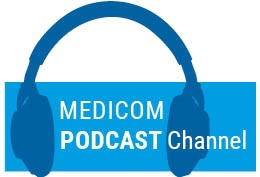Study presenter Myrthe Jongsma (Erasmus MC, the Netherlands) received an award for best investigator-initiated abstract at the ECCO-IBD 2020 meeting. Eligible patients in this study were aged 3–17�
years and had new-onset, untreated disease with a weighted paediatric CD activity index (wPCDAI) >40. Top-down treatment consisted of 5 infliximab (CT-P13) infusions of 5 mg/kg (in week 0, 2, 6, 14, and 22) combined with azathioprine. Step-up treatment comprised exclusive enteral nutrition or oral prednisolone as induction, plus azathioprine as maintenance treatment. The primary endpoint was sustained clinical remission (wPCDAI <12.5) at week 52 without additional therapy or surgery. A total of 97 patients were randomised to top-down (n=49) or step-up (n=48).
After 52 weeks, significantly more patients in the top-down group were in clinical remission (44%) than in the step-up group (17%; P=0.004). Infliximab was (re)started after induction therapy in 39% of top-down versus 62% of step-up patients (P=0.019). After 10 weeks, top-down- compared with step-up-treated patients had higher clinical remission rates (61% vs 39%; P=0.033), higher endoscopic remission rates (59% vs 17%; P=0.001), and more frequent faecal calprotectin levels of <250 μg/g (53% vs 26%; P=0.027).
- Jongsma M, et al. ECCO-IBD 2020, OP38.
Posted on
Previous Article
« High versus standard adalimumab in active UC Next Article
Biologics before surgery in IBD do not elevate infection risk »
« High versus standard adalimumab in active UC Next Article
Biologics before surgery in IBD do not elevate infection risk »
Table of Contents: ECCO 2020
Featured articles
Gut Microbiome as Treatment Target
Response to faecal microbiota transplantation in UC
Bioactives produced by gut bacteria to modulate immune response
Big Data Analysis
Multi-omics help describe CD phenotypes
The positive impact of genetic data on drug development
Experimental Therapies: Study Results
AMT-101: an oral human IL-10 fusion protein
Phase 2 results of first-in-class TL1A inhibitor
Open-label extension study of risankizumab: final results
Clinical remission after dose escalation of upadacitinib
Short- and Long-Term Treatment Results
Infliximab discontinuation increases relapse risk
Tofacitinib ‘real-world’ effectiveness in active UC
Subcutaneous ustekinumab as maintenance therapy in UC
Subcutaneous vedolizumab maintenance therapy in CD
Vedolizumab treatment persistence and safety
Specific Therapeutic Strategies
Impact of strategies on intestinal resection rate
Early ileocaecal resection in CD patients failing conventional treatment
Biologics before surgery in IBD do not elevate infection risk
Top-down infliximab superior to step-up in children with CD
High versus standard adalimumab in active UC
Head-to-Head Comparison of Treatments
Vedolizumab and anti-TNF therapies: a real-world comparison
Cancer Risk
Increased risk of small bowel cancer in IBD
Increased incidence of colorectal cancer and death in CD
Risk of rectal, anal cancer increased in perianal CD
Glyco-fingerprint as risk factor of UC-associated cancer
Miscellaneous Topics
Resolution of mucosal inflammation has dramatic effect
PICaSSO validated in real-life study
Re-inducing inflammation in organoids from UC patients
Role of immune cells in intestinal fibrosis
Association between meat consumption and IBD risk
CD exclusion diet corrects dysbiosis
Related Articles
April 14, 2020
Phase 2 results of first-in-class TL1A inhibitor

April 14, 2020
Tofacitinib ‘real-world’ effectiveness in active UC

March 25, 2020
ECCO 2020 Highlights Podcast
© 2024 Medicom Medical Publishers. All rights reserved. Terms and Conditions | Privacy Policy
HEAD OFFICE
Laarderhoogtweg 25
1101 EB Amsterdam
The Netherlands
T: +31 85 4012 560
E: publishers@medicom-publishers.com

